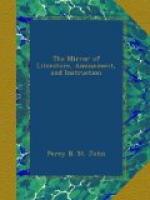The ringleaders were immediately hanged between the Red Columns on the Piazzetta—some singly, some in couples; and the two chiefs of them, Bertuccio Israello and Calendaro, with a cruel precaution not uncommon in Venice, were previously gagged. Nor was the process of the highest delinquent long protracted. He appears neither to have denied nor to have extenuated his guilt; and, ’on Friday the 16th day of April, judgment was given in the Council of X. that my Lord Marino Faliero the Duke should have his head cut off, and that the execution should be done on the landing-place of the stone staircase, the Giant’s Stairs, where the doges take their oath when they first enter the palace. On the following day, the doors of the palace being shut, the duke had his head cut off, about the hour of noon; and the cap of estate was taken from the duke’s head before he came down the staircase. When the execution was over, it is said, that one of the chiefs of the Council of X. went to the columns of the palace against the Piazza, and, displaying the bloody sword, exclaimed, “Justice has fallen on the traitor!” and, the gates being then opened, the populace eagerly rushed in to see the doge who had been executed.’
The body of Faliero was conveyed, by torchlight, in a gondola, and unattended by the customary ceremonies, to the church of San Giovanni and San Paolo; in the outer wall of which a stone coffin is still imbedded, with an illegible inscription, which once presented the words, Hic jacet Marinus Feletro Dux. His lands and goods were confiscated to the state, with the exception of 2,000 ducats, of which he was permitted to dispose; and, yet further to transmit to posterity the memory of his enormous crime, his portrait was not admitted to range with those of his brother doges in the Hall of the Great Council. In the frame which it ought to occupy is suspended a black veil, inscribed with the words, Hic est locus Marini Feletro decapitati pro criminibus.
The fate of Beltramo deserves a few words. He was amply rewarded for his opportune discovery, by a pension of a thousand ducats in perpetuity, the grant of a private residence which had belonged to Faliero, and inscription in the Golden Book. Dissatisfied, however, with this lavish payment for a very ambiguous virtue, he lost no occasion of taxing the nobles with neglect of his services, and of uttering loud calumnies against them, both secretly and in public. The government, wearied by his importunities and ingratitude, at length deprived him of his appointments, and sentenced him to ten years exile at Ragusa; but his restless and turbulent spirit soon prompted him to seek a spot less under the control of the signory, in which he might vent his railings afresh, and with impunity. It is probable that the long arm of the Council of X. arrested his design, for we are significantly informed that he perished on his way to Pannonia.
The volume is embellished with seven Plates, by Finden, from Drawings by Prout; and nine characteristic Wood-cuts, chiefly from Titian. Considering the excellence of the originals, more pains might have been bestowed upon the latter; and Mr. Prout might surely have found different points of view from those he has so recently given in the Landscape Annual. The book altogether is a marvel of cheapness.




